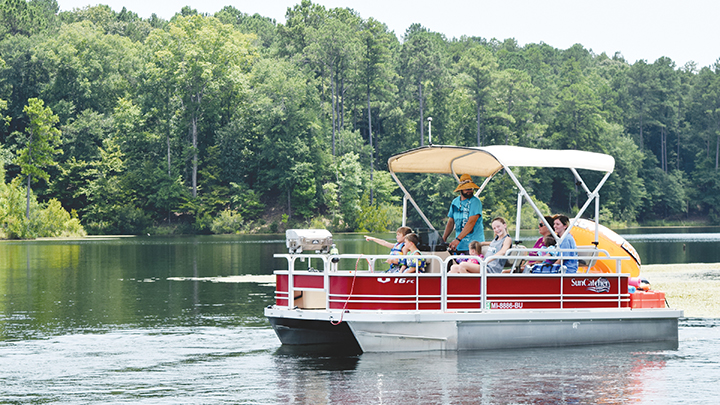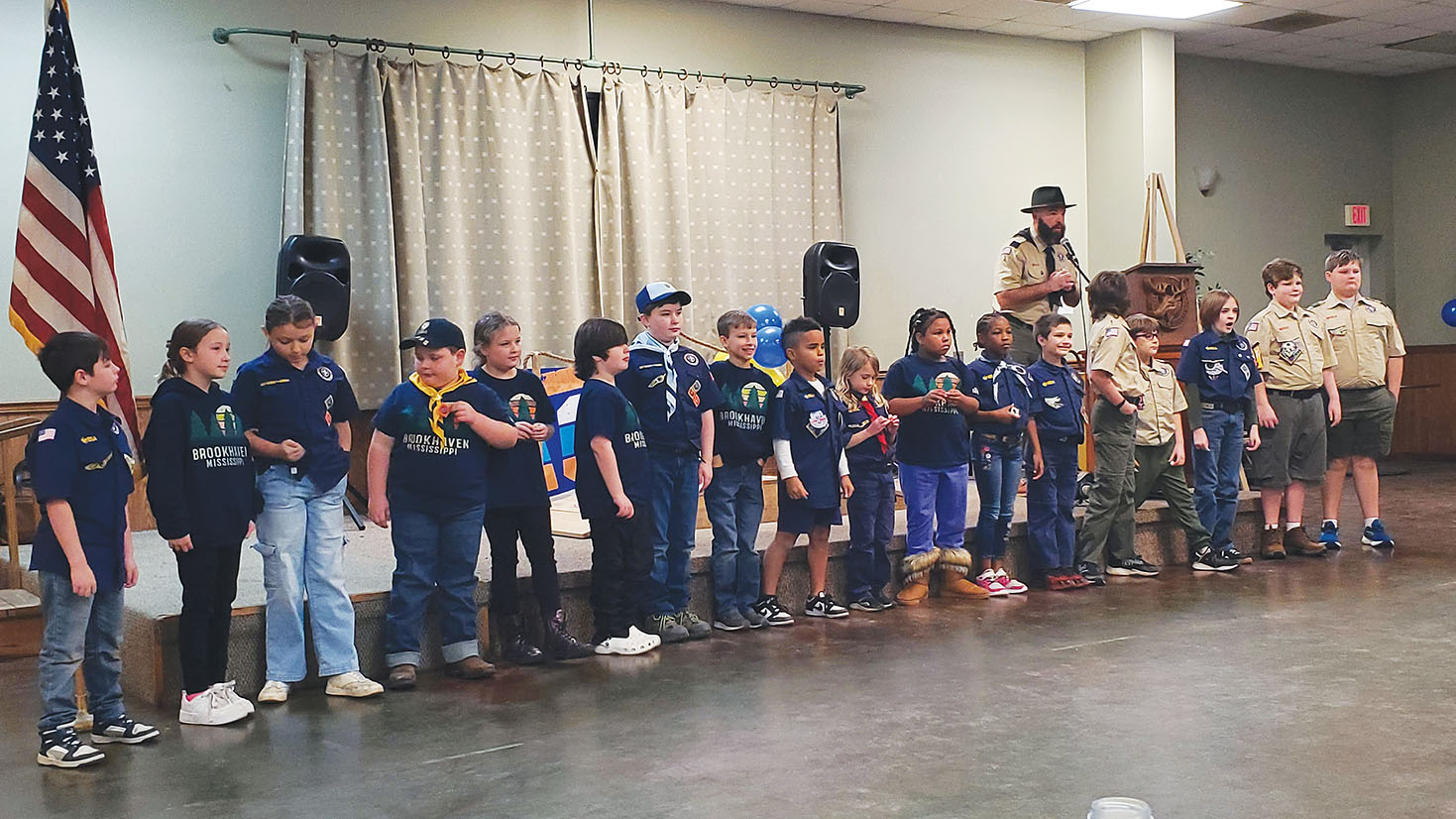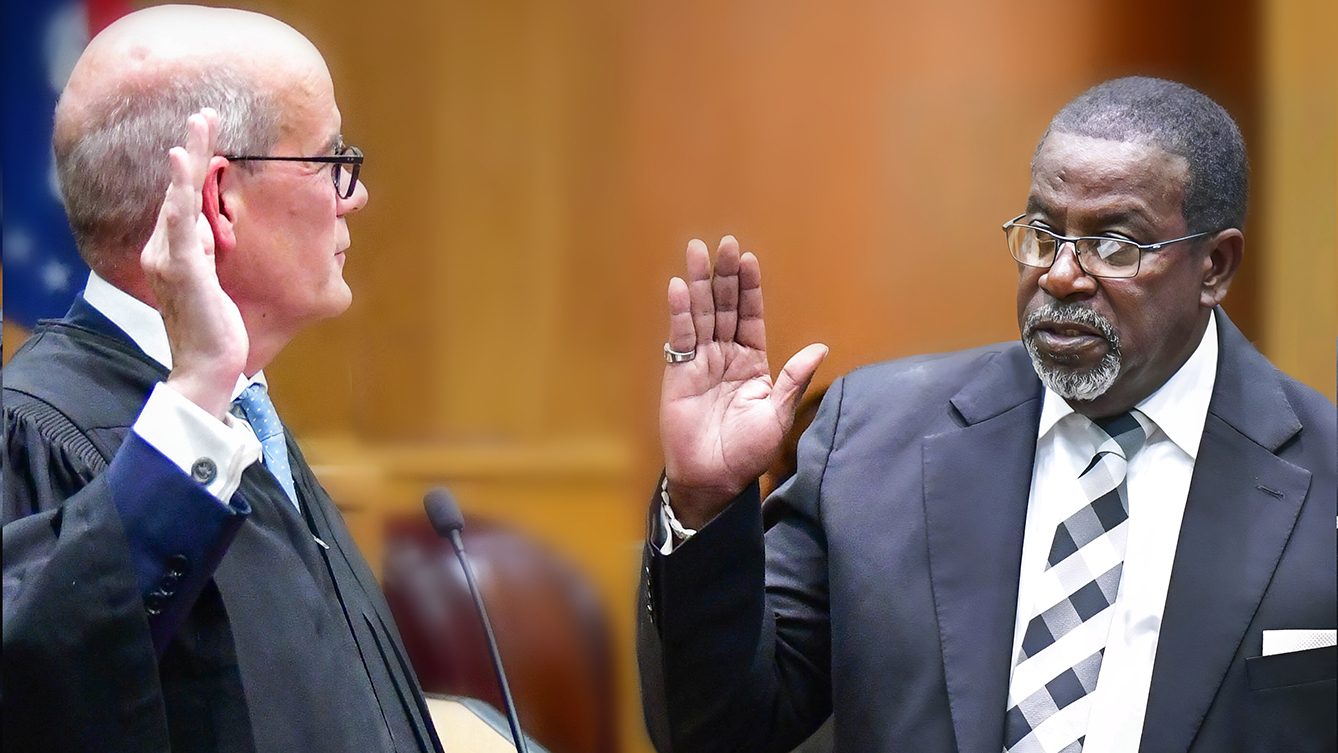Vacancy at Okhissa Lake — Group hopes federal gov’t will sell public land
Published 9:20 pm Friday, July 20, 2018

- The Broussards of Summit and the McGoverns of McComb head out into Okhissa Lake for an afternoon on the water in 2018. (File Photo)
He put in around noon on Friday.
Summit’s Donald Broussard backed his 16-foot SunCatcher pontoon off the trailer and into the black water of Okhissa Lake, swinging it around carefully to glide into the floating dock. Nearby, the women sprayed sunscreen and hung floaties on the children, and the boys threw rocks into the duckweed. Onboard, they had grocery bags, a propane grill and not one fishing pole.
“Soon as I get out in the lake, I’m gonna start cooking for these kids,” Broussard said. “We come up here all the time, and if they had cabins or something like that, I’d rent one, even though I just live an hour away.”
There are no cabins. No lodges. Not even overnight camping. Okhissa Lake has a few covered pavilions and some restrooms, but no places to stay within 30 miles.
A local economic development group wants to change that, and they’re on the verge of getting permission to buy up 150 acres of publicly-owned land in the Homochitto National Forest for the construction of rental property on the lake, if federal lawmakers greenlight the current version of the national farm bill.
Section 8633 of the amended Agriculture Improvement Act of 2018, labeled “Okhissa Lake Rural Economic Development Land Conveyance,” authorizes the Scenic Rivers Development Alliance to purchase 150 acres on the lake near Bude for fair market value, with the National Forest Service shedding all right and title to the property via quitclaim deed. Meadville Mayor Lane Reed — who works with the alliance through the town’s partnership with alliance member Franklin County — said the alliance is seeking the land to develop rental property and other amenities around Okhissa Lake to help promote the lake as a regional destination for recreation.
“We are primarily looking for a hotel that would serve as a centerpiece for the 11-county area of Southwest Mississippi that would aid in development around our lake,” he said. “Scenic Rivers has become very active in promoting outdoor events, and there’s not really a place large enough here that can host those events. There is a tremendous need for, for lack of a better word, a centralized hotel in Southwest Mississippi.”
The amendment was inserted into the farm bill by Republican U.S. Sen. Cindy Hyde-Smith of Brookhaven. It calls for the acreage, located near the intersection of U.S. Hwy. 98 and Berrytown Road on Okhissa Lake’s northwest corner, to be appraised according to federal standards and paid for in cash, with Scenic Rivers paying the price and the cost of any appraisals or environmental studies.
The amendment gives the alliance 180 days from the passage of the farm bill to submit its purchase request in writing. It also allows the government to determine if the sale is in the public interest and to proceed with a public or private sale.
The farm bill has passed both the House and Senate and is currently in conference committee.
The Daily Leader has attempted to contact Hyde-Smith for comment on her amendment since July 12. Emails, voicemails and text messages to her and her staff were not returned.
Scenic Rivers is an alliance among the boards of supervisors of Amite, Franklin, Pike and Walthall counties, as well as the City of McComb, the Pike County Economic Development District and the Wilkinson County Industrial Development Authority. It was made official in near-unanimous votes in the state House and Senate earlier this year and signed into law by Gov. Phil Bryant.
The alliance stepped in to take over management of the Bogue Chitto Water Park, given to Pike County upon the closure of the Pearl River Basin Development District, which ran out of funding and shut down July 1.
Promises were made
Reed said development around Okhissa Lake isn’t a new idea. Plans for the lake were first dreamed up in the 1960s, and former U.S. Sen. Thad Cochran worked on the project for years before it finally came together in the 1990s under the National Forest Service.
Okhissa Lake opened in 2007. It features 1,075 acres of water, 39 miles of shoreline, two boat ramps, restrooms, a gazebo and parking areas. The NFS estimates 10,000 people visited the lake in 2017.
Reed said development at the lake wasn’t supposed to end with restrooms and parking lots.
“We have a beautiful 1,200-acre lake that, for various reasons, the forest service hasn’t been able to, or chose not to, develop,” he said. “We took 1,200 acres out of timber production for a lake, and now we have day fishing here — you’re not going to have people come from Texas or Georgia to do a one-day fishing trip.”
NFS spokesman Mario Rossilli said in a statement the organization issued requests for proposals for further development when the lake opened and has received no responses.
“To this point, it seems that there has not been sufficient commercial interest to support further economic development of Okhissa Lake,” he said. “In June 2012, a limited market analysis of Okhissa Lake found that there were no opportunities for investors to make a profit through development of RV camping and cabins.”
Reed — an attorney who specializes in real estate and corporate law — countered lease terms in the forest service’s RFPs did not leave investors enough time to recoup and profit. He said the organization did not craft its nationwide RFP process to fit the specifics of Southwest Mississippi.
The alliance believes times have changed since the forest service issued its call for investors and wants a crack at the job.
“We’re optimistic we’d have some different developers take a look at the project if we can get that far down the road,” said Joseph Parker, executive director for Scenic Rivers. “Marketing and promotion is the very first thing we’ll have to do. We all recognize we have to let everybody know about the great asset we have.”
This land is your land
Privatizing a chunk of the Homochitto National Forest — even though the tract is small — brings to Southwest Mississippi a political debate seldom seen on the east side of the Mississippi River.
The selling of public land out west, where the federal government owns 46 percent of the 11 traditionally western states, is a contentious issue and a Republican-led effort dating back 10 years to former vice presidential candidate Sarah Palin’s infamous comment to “drill, baby, drill” for oil on federal land.
The Obama administration extended federal land protections by adding 34 new national monuments, the most by any president. The Trump administration has moved in the opposite direction, rolling back some designations. Ranchers, developers and mineral producers mostly support the sale or transfer of federal land into state hands — states have a track record of selling it — while outdoorsmen like hunters and hikers tend to rally toward public lands advocacy groups.
But it’s largely a western fight, focused on millions of acres of desert, prairie and mountains. The Wilderness Society, the Outdoor Alliance, the Izaak Walton League and Backcountry Hunters and Anglers — all of which work to protect public lands and access — declined to comment for this story.
This land is my land
Reed believes the loss of 150 acres of national forest land — a small section of the Homochitto’s nearly 192,000 acres — will help the public enjoy the land, not hinder it.
“That land was to be held in public trust, but due to environmental restrictions there’s not as much timber cutting, and that doesn’t generate the revenue for Franklin County that it would if it was in private hands and taxed,” he said. “If we can take some of that land and develop it, put tax dollars into Franklin County, we’re going to give the public even better access. Outdoors recreation is what we’re known for, and what we’re good at.”
Bobby Moak, head of the Mississippi Democratic Party and a former 30-year state lawmaker who represented part of Franklin County, was a member of the House Ways and Means Committee in the late 1990s and helped get the Okhissa Lake project finalized with a $6 million bond bill for road construction. That done, Cochran pushed the project into the federal appropriations bill that passed on Nov. 29, 1999.
Moak agreed “the ball was dropped” on developing the lake, and he praised Scenic Rivers and the group’s efforts at promoting the region. He said the group should be allowed to try, but provisions should be made to return the 150 acres to the forest service if the project fails.
“As long as that property is not going to be able to be sold to individuals or get outside the public realm,” Moak said. “That whole area is very tender because people actually had to leave their farms and homes for the lake to be built, and for the most part they did so willingly. I would certainly want to have a kicker in the amendment that adds onto the quitclaim deed saying it would not be transferred to any private individuals at any time.”
Agreement could be tough
The project has a long way to go, and Hyde-Smith’s amendment is riding in a farm bill with controversial requirements.
It passed the House by two votes, 213-211, with new rules for food stamps that would require able-bodied recipients to work at least 20 hours per week to receive benefits. The new requirement was inserted by Republican Speaker of the House Paul Ryan. The Senate version of the bill, which contained no work requirements, passed easily, 86-11.
If the bill comes out of conference with Ryan’s food stamp changes intact, it will face another Senate review likely absent of Democratic support. It will need 60 votes to pass, and the Republican-Democrat split in the chamber is 51-47.
With such a battle looming, the alliance has yet to develop costs, funding sources or conceptual plans for developing Okhissa Lake, Reed said.
“We have not gotten the cart ahead of the horse, nor will we,” he said. “I don’t think that’s even on the radar yet until we get a final bill.”





